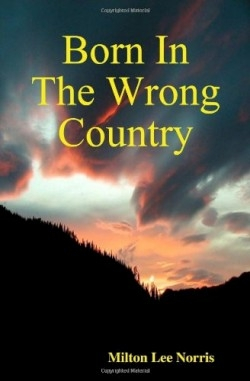Born in the Wrong Country
“It seems as if I am feeling the pain that my mother my father my grandparents great-grandparents and great-great-grandparents felt” Milton Lee Norris writes. The ramifications of chattel slavery and institutionalized and intractable racism in the United States have never been thoroughly studied. In social critic Milton Lee Norris’s stream of consciousness book—really an open letter to white America—the residual pain humiliation and righteous anger call from the pages.
In this deeply personal book written in the aftermath of the attacks on the U.S. on 9/11 and the subsequent wars on Afghanistan and Iraq Norris a first-time author explains how he as an “African-American Person of Color” feels about the present condition of Black people. His sense of betrayal from repeated repression including slavery the failure of reconstruction the climate of fear in the age of lynching Jim Crow laws segregation entrenched racism and ignorance and intolerance from the majority of white people has the essence of a red hot truth that has never been completely discussed or eradicated in the United States.
But Norris’s scope is greater than that. He makes scores of important points and no one escapes his scrutiny including the government the Bush administration rich African-Americans racists homophobes brutal cops white Christian missionaries war makers Republicans people who don’t vote people who misinterpret God’s teachings and swearing mothers who lecture their kids about using obscenities. He chides the U.S. for being the “land of amnesia and fabrication.”
The book is a traditional polemic. He calls for better healthcare housing education assistance to the poor justice internationalism and gay marriage. He makes the argument that “America” as an idea has moved (perhaps to Iraq where all of the money seems to be going) and deserted her people. While the strength of the book is its politics its weakness is in the tone. When Norris explains issues and uses stories from his own life or the lives of others his points come alive. Unfortunately he doesn’t use this technique often enough. Instead of giving the uninitiated reader something to grab onto to increase their understanding they are left with rhetoric.
Norris’s passion for life and his deep sense of how things should be shines through. He also reveals himself as a vulnerable man who loves self expression and thought and who feels the bone-deep pain of discrimination and the historically significant ramifications of slavery. Norris asks “Do you understand that slavery had an effect not just on the bodies but also on the minds and spirits of a once highly spirited people?” Unfortunately the answer he finds most often is: No.
Disclosure: This article is not an endorsement, but a review. The publisher of this book provided free copies of the book and paid a small fee to have their book reviewed by a professional reviewer. Foreword Reviews and Clarion Reviews make no guarantee that the publisher will receive a positive review. Foreword Magazine, Inc. is disclosing this in accordance with the Federal Trade Commission’s 16 CFR, Part 255.

